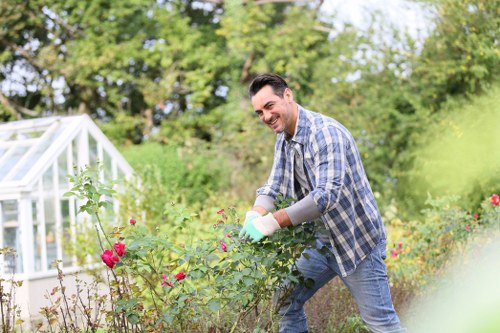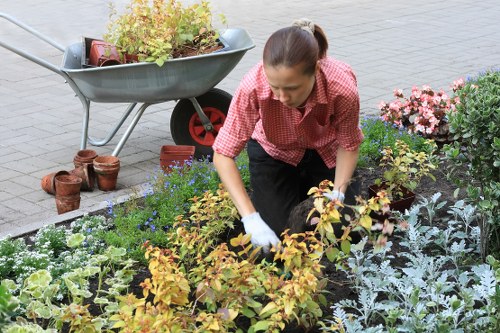Comprehensive Guide to Garden Maintenance in Mill Park

Maintaining a beautiful garden in Mill Park requires dedication, knowledge, and the right tools. Whether you're a seasoned gardener or a beginner, understanding the essentials of garden maintenance can transform your outdoor space into a lush, vibrant oasis.
Mill Park's unique climate and soil conditions offer both opportunities and challenges for garden enthusiasts. By implementing effective maintenance practices, you can ensure your plants thrive throughout the year.
From regular pruning to seasonal planting, garden maintenance in Mill Park involves a variety of tasks that contribute to the overall health and aesthetics of your garden.
Essential Garden Maintenance Tasks

Keeping your garden in top shape requires a systematic approach. Here are some essential garden maintenance tasks that every Mill Park resident should consider:
- Regular Weeding: Weeds compete with your plants for nutrients and water. Regular removal helps maintain plant health.
- Pruning and Trimming: Proper pruning encourages healthy growth and enhances the shape of your plants.
- Lawn Care: Mowing, aerating, and fertilizing your lawn are crucial for a lush, green appearance.
- Soil Health: Testing and amending your soil ensures it provides the necessary nutrients for plant growth.
- Water Management: Efficient watering practices prevent overwatering and ensure plants receive adequate moisture.
Implementing these tasks consistently will lead to a resilient and flourishing garden.
Each season brings its own set of maintenance requirements, allowing you to plan and execute tasks that align with the growth cycles of your plants.
Seasonal Garden Maintenance

Seasonal changes in Mill Park necessitate specific garden maintenance activities to keep your garden healthy and vibrant.
- Spring: Begin by cleaning up winter debris, planting new flowers, and preparing your soil.
- Summer: Focus on watering, weeding, and pest control to protect your plants during the warmer months.
- Autumn: Harvest remaining produce, prune dead branches, and prepare your garden beds for winter.
- Winter: Protect sensitive plants from frost, plan for the upcoming year, and maintain your gardening tools.
Adapting your maintenance routine to the seasons ensures your garden remains healthy and aesthetically pleasing year-round.
Choosing the Right Plants for Mill Park

Selecting plants that are well-suited to Mill Park's climate and soil conditions is crucial for successful garden maintenance.
Consider the following factors when choosing plants:
- Climate Compatibility: Choose plants that thrive in the local temperature and precipitation patterns.
- Soil Type: Understanding your soil's pH and nutrient levels can guide your plant selection.
- Sunlight Requirements: Ensure plants receive the appropriate amount of sunlight based on their specific needs.
- Maintenance Level: Select plants that align with the amount of time you can dedicate to garden upkeep.
By carefully selecting plants, you can reduce maintenance efforts and enhance the beauty of your garden.
Additionally, integrating native plants can promote biodiversity and support local ecosystems.
Native Plants Benefiting Mill Park Gardens

Incorporating native plants into your garden offers numerous benefits, including resilience to local pests and diseases.
Some native plants suitable for Mill Park include:
- Eucalyptus: Known for its aromatic foliage and fast growth.
- Grevillea: Attracts birds and pollinators with its vibrant flowers.
- Acacias: Provides shade and adds structural beauty to your garden.
- Banksia: Thrives in various soil types and showcases striking blooms.
- Lavender: Offers fragrance and attracts beneficial insects.
These plants not only enhance the visual appeal of your garden but also contribute to a sustainable and eco-friendly environment.
By choosing native species, you support local wildlife and reduce the need for excessive fertilizers and pesticides.
Effective Watering Techniques

Proper watering is a cornerstone of successful garden maintenance in Mill Park. Implementing efficient watering techniques ensures your plants receive the right amount of moisture without wastage.
Here are some effective watering strategies:
- Drip Irrigation: Delivers water directly to the plant roots, minimizing evaporation.
- Soaker Hoses: Ideal for evenly distributing water across garden beds.
- Rain Barrels: Collect rainwater to use during dry periods, promoting sustainable gardening practices.
- Watering Schedule: Water early in the morning or late in the evening to reduce water loss.
By adopting these techniques, you can maintain a healthy garden while conserving water resources.
Consistent and appropriate watering also prevents common plant issues such as root rot and nutrient deficiencies.
Mulching for Moisture Retention

Mulching is an effective method for retaining soil moisture, regulating temperature, and suppressing weed growth.
Key benefits of mulching include:
- Moisture Retention: Reduces the need for frequent watering by keeping the soil consistently moist.
- Temperature Regulation: Insulates roots from extreme temperature fluctuations.
- Weed Suppression: Limits the growth of invasive weed species by blocking sunlight.
- Soil Improvement: Organic mulches decompose over time, enriching the soil with essential nutrients.
Applying a layer of mulch around your plants can significantly enhance the overall health and appearance of your garden.
Choose organic mulches like bark, straw, or compost to provide additional benefits to your soil.
Pest and Disease Management

Effective pest and disease management is crucial for maintaining a healthy garden. In Mill Park, a proactive approach can prevent minor issues from escalating.
Here are some strategies to manage pests and diseases:
- Regular Inspection: Routinely check your plants for signs of pests or diseases.
- Natural Predators: Encourage beneficial insects like ladybugs and spiders to control pest populations.
- Organic Treatments: Use neem oil or insecticidal soap to treat affected plants without harming the environment.
- Proper Sanitation: Remove and dispose of diseased plant material to prevent the spread of infections.
Implementing these measures can help maintain plant health and reduce the reliance on chemical pesticides.
Healthy plants are more resistant to pests and diseases, emphasizing the importance of overall garden maintenance.
Integrated Pest Management (IPM)

Integrated Pest Management (IPM) is a sustainable approach that combines biological, cultural, and chemical methods to control pests effectively.
Key components of IPM include:
- Identification: Accurately identify the pest to determine the appropriate control methods.
- Monitoring: Keep track of pest populations and their impact on your garden.
- Prevention: Implement cultural practices like crop rotation and proper spacing to reduce pest habitats.
- Control: Use a combination of biological controls, such as introducing natural predators, and the judicious use of chemical treatments when necessary.
By adopting IPM, you can achieve effective pest control while minimizing environmental impact.
This holistic approach promotes long-term garden health and sustainability.
Soil Health and Fertilization

Healthy soil is the foundation of a thriving garden. Proper soil maintenance and fertilization provide the essential nutrients plants need to grow robustly.
Consider the following practices to enhance soil health:
- Soil Testing: Analyze your soil to determine its pH level and nutrient content.
- Organic Matter: Incorporate compost or well-rotted manure to improve soil structure and fertility.
- Crop Rotation: Diversify the types of plants grown in each area to prevent nutrient depletion and reduce pest issues.
- Cover Crops: Plant cover crops during off-seasons to protect the soil from erosion and add organic material.
Regular fertilization, tailored to your soil's needs, ensures that plants receive the necessary nutrients for optimal growth.
Using organic fertilizers promotes sustainable gardening practices and fosters a healthy ecosystem in your garden.
Types of Fertilizers

Choosing the right fertilizer is essential for supporting plant growth and maintaining soil health. There are various types of fertilizers available, each with unique benefits:
- Organic Fertilizers: Derived from natural sources like compost, manure, and bone meal, they improve soil structure and promote microbial activity.
- Inorganic Fertilizers: Manufactured chemically, they provide specific nutrients in concentrated forms but may require cautious application to avoid soil imbalance.
- Slow-Release Fertilizers: Gradually release nutrients over time, reducing the risk of nutrient runoff and providing sustained nourishment.
- Liquid Fertilizers: Easily absorbed by plants, they are ideal for rapid nutrient uptake, especially during active growth periods.
Selecting the appropriate fertilizer based on your garden's needs can significantly enhance plant health and productivity.
Always follow recommended application rates to prevent over-fertilization, which can harm plants and degrade soil quality.
Pruning and Trimming Techniques

Pruning and trimming are essential practices for maintaining the shape, health, and productivity of your plants. Proper techniques ensure that your garden remains well-organized and aesthetically pleasing.
Key pruning techniques include:
- Thinning: Removing entire branches to improve air circulation and light penetration.
- Heading: Cutting back branches to encourage bushier growth.
- Deadheading: Removing spent flowers to promote continuous blooming.
- Shearing: Shaping plants, particularly shrubs and hedges, for a uniform appearance.
Regular pruning enhances plant health by removing damaged or diseased parts and stimulating new growth.
Understanding the specific needs of each plant species ensures that your pruning efforts are effective and beneficial.
Tools for Pruning and Trimming

Having the right tools is crucial for effective pruning and trimming. Invest in quality equipment to ensure clean cuts and reduce stress on your plants.
- Pruning Shears: Ideal for small branches and precise cuts.
- Loppers: Suitable for thicker branches that require more leverage.
- Pruning Saws: Essential for cutting through large branches and major limbs.
- Hedge Trimmers: Designed for shaping and maintaining hedges and shrubs.
- Gloves and Safety Gear: Protect your hands and eyes while working in the garden.
Regularly maintain your tools by cleaning and sharpening them to ensure their longevity and performance.
Using the appropriate tools for each task enhances efficiency and contributes to the overall health of your garden.
Mulch and Compost Usage

Incorporating mulch and compost into your garden maintenance routine offers numerous benefits, including soil enrichment, moisture retention, and weed suppression.
Benefits of using mulch:
- Improves Soil Structure: Enhances soil aeration and drainage.
- Regulates Soil Temperature: Keeps roots cool in summer and warm in winter.
- Reduces Evaporation: Maintains consistent soil moisture levels.
Compost adds:
- Nutrients: Provides essential elements like nitrogen, phosphorus, and potassium.
- Microbial Activity: Promotes a healthy soil ecosystem.
- Organic Matter: Improves soil fertility and structure.
Regular application of mulch and compost enriches your garden, fostering robust plant growth and sustainability.
These organic materials not only support plant health but also contribute to eco-friendly gardening practices.
Making Your Own Compost

Creating your own compost is an effective way to recycle garden waste and kitchen scraps into valuable soil amendment.
Steps to make compost:
- Choose a Compost Bin: Select a location with good drainage and easy access.
- Add Materials: Combine green materials (e.g., vegetable scraps, grass clippings) with brown materials (e.g., leaves, straw).
- Maintain Moisture: Keep the compost pile damp, similar to a wrung-out sponge.
- Aerate Regularly: Turn the compost to introduce oxygen and speed up decomposition.
- Harvest: After several months, the compost should be dark, crumbly, and ready to use.
Homemade compost enriches your soil with nutrients and improves its texture, leading to healthier plants.
By composting, you reduce waste and support sustainable gardening practices.
Maintaining Garden Tools

Proper maintenance of garden tools is essential for their longevity and effective performance. Well-maintained tools make garden maintenance tasks easier and more efficient.
Tips for maintaining garden tools:
- Cleaning: Remove dirt and debris after each use to prevent rust and corrosion.
- Sharpening: Regularly sharpen blades for precise cuts and optimal functionality.
- Oil and Lubricate: Apply oil to metal parts to prevent rust and ensure smooth operation.
- Storage: Store tools in a dry, sheltered area to protect them from the elements.
- Inspect for Damage: Check tools for any signs of wear or damage and repair or replace as needed.
Investing time in tool maintenance enhances their performance and extends their service life.
Using well-maintained tools also reduces the risk of accidents and ensures that maintenance tasks are completed efficiently.
Essential Garden Tools

Having the right set of garden tools is fundamental for effective garden maintenance in Mill Park. Here are some essential tools every gardener should have:
- Hand Trowel: Perfect for digging small holes and transplanting seedlings.
- Garden Fork: Useful for turning soil and aerating garden beds.
- Pruning Shears: Essential for trimming and shaping plants.
- Lawn Mower: Keeps your lawn neat and well-maintained.
- Watering Can or Hose: Ensures your plants receive adequate moisture.
- Gloves: Protect your hands from dirt, thorns, and insects.
Investing in quality tools makes garden maintenance more manageable and enjoyable.
Regularly upgrading your toolset can further enhance your gardening efficiency and results.
Garden Design and Layout

A well-designed garden layout not only enhances the aesthetic appeal but also facilitates easier maintenance. Thoughtful planning can lead to a more functional and sustainable garden space.
Consider the following design principles:
- Zones: Divide your garden into zones based on plant types and maintenance needs.
- Pathways: Incorporate pathways for easy access to different areas of the garden.
- Focal Points: Create focal points with feature plants or garden structures to add visual interest.
- Vertical Gardening: Utilize vertical space with trellises or shelves to maximize plant growth.
- Companion Planting: Group compatible plants together to promote mutual growth and pest resistance.
A strategic garden design simplifies maintenance tasks and enhances the overall beauty of your outdoor space.
Regularly reassessing your garden layout can lead to improvements and adaptations as your garden evolves.
Sustainable Garden Practices

Adopting sustainable gardening practices contributes to environmental conservation and enhances the resilience of your garden.
Key sustainable practices include:
- Rainwater Harvesting: Collect and use rainwater to reduce dependence on municipal water sources.
- Composting: Recycle organic waste into nutrient-rich compost for your garden.
- Native Planting: Choose native species that require less water and are more resistant to local pests.
- Organic Gardening: Avoid synthetic fertilizers and pesticides to maintain a healthy ecosystem.
- Energy-Efficient Lighting: Use solar-powered lights to illuminate pathways and garden features.
Implementing these practices enhances your garden's sustainability and reduces its environmental footprint.
Sustainable gardening not only benefits your garden but also supports the broader community and ecosystem.
Local Garden Maintenance Services in Mill Park

For those who prefer professional assistance, Mill Park offers a variety of garden maintenance services tailored to meet diverse needs.
Popular services include:
- Lawn Mowing and Care: Regular mowing, edging, and fertilizing to maintain a pristine lawn.
- Pruning and Trimming: Expert pruning services to ensure healthy and well-shaped plants.
- Weeding and Pest Control: Comprehensive weed removal and pest management solutions.
- Landscape Design: Customized garden designs to enhance the beauty and functionality of your outdoor space.
- Soil Testing and Amendments: Professional soil analysis and recommendations for optimal plant growth.
Hiring professional garden maintenance services can save time and ensure that your garden receives expert care.
Consider reaching out to local providers to discuss your specific garden needs and preferences.
Choosing the Right Service Provider

Selecting a reliable garden maintenance service in Mill Park involves evaluating various factors to ensure quality and satisfaction.
- Experience and Expertise: Assess the provider's experience and knowledge in handling different garden types and issues.
- Range of Services: Ensure the provider offers the specific services you require.
- Customer Reviews: Check testimonials and reviews to gauge client satisfaction and service quality.
- Pricing: Compare pricing structures to find a service that fits your budget without compromising quality.
- Licensing and Insurance: Verify that the provider holds the necessary licenses and insurance to protect your property and interests.
Thoroughly researching and selecting a reputable service provider ensures that your garden receives the best possible care.
Don't hesitate to ask for references or conduct interviews to find a provider that aligns with your gardening goals.
Nearby Areas to Mill Park Offering Garden Maintenance

Mill Park is surrounded by several neighborhoods and suburbs that also benefit from top-notch garden maintenance services. Understanding the proximity and unique features of these areas can help you choose the right service provider.
- Lalor: Just north of Mill Park, Lalor offers expansive residential gardens and parks that require regular maintenance.
- Broadmeadows: Known for its diverse plant life, Broadmeadows residents often seek specialized gardening services.
- South Morang: This suburb features numerous new housing developments with lush gardens needing expert care.
- Mernda: Mernda's community gardens and green spaces benefit from sustainable maintenance practices.
- North Coburg: With its mix of traditional and modern gardens, North Coburg requires versatile garden maintenance solutions.
- Craigieburn: Craigieburn's extensive parks and recreational areas necessitate large-scale garden maintenance services.
- Maidstone: The serene environment of Maidstone's gardens demands meticulous care and attention.
- Thomastown: Thomastown's urban gardens and green rooftops seek innovative maintenance approaches.
- Reservoir: Reservoir's historic gardens and plant collections require specialized maintenance expertise.
- Keon Park: Keon Park's family-friendly gardens focus on child-safe and pet-friendly maintenance practices.
Each of these nearby areas has its own unique gardening needs, making it essential to choose a service provider familiar with local conditions and preferences.
Whether you're in Mill Park or one of its neighboring suburbs, professional garden maintenance services can help you achieve a beautiful and healthy outdoor space.
Benefits of Local Garden Maintenance Services

Opting for local garden maintenance services offers several advantages, including:
- Local Expertise: Familiarity with the regional climate, soil conditions, and plant varieties ensures effective maintenance.
- Quick Response: Proximity allows for prompt service and support when needed.
- Community Support: Supporting local businesses contributes to the economic well-being of the area.
- Personalized Services: Local providers often offer customized solutions tailored to individual garden needs.
- Reliability: Established local services typically have a reputation to uphold, ensuring consistent quality.
Choosing local garden maintenance services enhances the sustainability and success of your gardening efforts.
Building a relationship with a local provider can lead to long-term benefits and a more harmonious garden environment.
Conclusion: Achieve a Flourishing Garden in Mill Park

Effective garden maintenance in Mill Park involves a combination of regular tasks, strategic planning, and professional assistance. By understanding the unique aspects of your garden and implementing the best practices outlined above, you can cultivate a vibrant and sustainable outdoor space.
Whether you choose to maintain your garden yourself or enlist the help of local professionals, the key to success lies in consistent care and informed decision-making.
Don't wait to transform your garden into the green haven you've always envisioned.
Contact us today to schedule your garden maintenance service and take the first step toward a stunning and healthy garden in Mill Park.
Book your service now and enjoy a beautifully maintained garden all year round!
